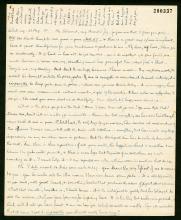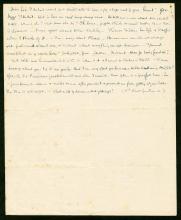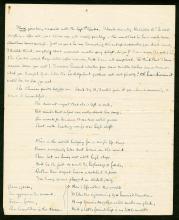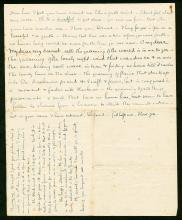BRACERS Record Detail for 19348
To access the original letter, email the Russell Archives.
"Wed. evg." My Beloved, My Heart's Joy, Forgive me that I gave you pain—" "To think that I have never seen you act!"
There are two transcriptions with text differences. See either record for the differences as they are the same: Document .052435, record 99901; document .201135, record 116371.
[Letter continues "Thursday mg."] This part of the letter, written sideways on the bottom of page 2, appears in transcriptions of document .200338, record 19349: document .201136, record 116372 (some omissions); document .052436, record 99904, first part of first page only (same omissions as above).
Letter 78
BR TO CONSTANCE MALLESON, 21–22 AUG. 1918
BRACERS 19348. AL. McMaster
Previous Brixton letter, BRACERS 19347; next letter, BRACERS 19349
Edited by K. Blackwell, A. Bone, N. Griffin and S. Turcon
<Brixton Prison>1
Wed evg 21 Aug. ’18. —
My Beloved, my Heart’s Joy, forgive me that I gave you pain. All the black thoughts are gone — gone absolutely — and there is a great song of love in my heart, love and great thankfulness for your tenderness and goodness to me. My dear, my Love, I love you so unutterably. It is hard in here not to get troubled — one is so impotent — and one feels one must become a mere memory, something much less powerful than actual flesh and blood. Forgive me, my Darling. And don’t be unhappy because I have moods — they are prison moods, and won’t be brought outside the prison gates. If one is energetic and accustomed to much activity, it is impossible to keep quite sane in prison. — Dear one, you were divine today — it is amazing how much one can communicate without words, in spite of the warder. It does make me ache when I see you — I do want your arms about me so dreadfully. I am absolutely happy now about you.
What is the place you go to in the Park?2 Have I been there with you ever? You mean Hyde Park? Dear one, don’t let me make you miserable. Remember that everything one has ever lived through comes back to one in prison. Childhood, the early days of my marriage, Cambridge at various stages of the 27 years3 I was connected with it, times with Ottoline — everything that has made any deep impression on my emotions comes in pictures. And the Blackpool time4 has to take its turn with the rest. Then there is sheer superstition: if all goes well, the happiness ahead is more than I can believe the gods will permit; and there is more hope that they will if one tells them one is not counting on it. I can’t help it: I am superstitious when a thing matters as much as that does.
Oh I did want to kiss your neck today. You draw the very life out of me to come to you. You do make all the other women I have ever known seem pale — it is vitality and will, as you said, with great beauty, and something besides that produces the extreme of physical attractiveness. What that something besides is, I don’t know — it is the indefinable quality5 that has belonged to all the women who have been famous for inspiring love.6 It is the thing that makes men go mad. And with it all you have heart, and one can love you sanely as well as madly. Can you wonder that at times I feel it impossible you should really love me?
Dear Love I didn’t want to “kill all the love and joy and hope out of your heart”.7 You know I didn’t. But in here one can’t keep always sane. Do tell me more about Eve Walsh Hall.8 Who is she? What does she do? Oh dear, people think so much better of me than I deserve. I was upset about Helen Dudley9 — I have broken her life and I suffer when I think of it. — I am sorry about Marie.10 Americans are almost always old-fashioned about sex, and indeed about everything except business. — I found scratched on a wall here: “Jack White,11 from Dublin, Ireland. Here for loving freedom.” — Eliot told me he wouldn’t be a C.O.12 when C.A. and I went to Marlow13 in April. — I love hearing about your I.L.P. tea-party.14 And I am very glad you have come to like Wuthering Heights!15 Yes, the I.L.P. warders greeted me16 at once when I arrived. One of them is a fearful bore — he is facetious, and comes and talks to me after your visit and prevents me from getting at your letter. The other is all right. — What a lot of disconnected jottings! (2nd sheet further on)
I will use Notre-Dame de Paris at visits, stuffed with old letters.17 These small books go quicker.18 I am afraid of not reaching you before you start for Priscilla’s.19 I shall be with you in spirit by the sea — think that all the time we have known each other I have not been allowed to be by the sea!20 But all the same I agree that it is best to go to Ashford first.a
I love your being occupied with the Expal. Theatre. I don’t see why Priscilla should be told anything21 — after all, you and Miles are not really parting22 — the news that he has a work-room elsewhere seems enough. Just as you and he are launching this enterprise together, you don’t want, I should think, anything that would make any éclat, do you? I am sorry the acting in the Centre23 won’t begin till after Xmas, but I am not surprised. To think that I have never seen you act! I never heard whether you saw Hindle Wakes24 somewhere, or what you thought of it. Was the Lichtgebet gesture25 cut out finally? Oh how divine it will be to see you act.
The Chinese poetry delights me. Don’t buy it, I will give it you.26 Some is amusing, and some is beautiful:
She does not regret that she is left so sad,
But minds that so few can understand her song.
She wants to become those two wild geese
That with beating wings rise high aloft.27
_________ .. _________
Man in the world lodging for a single life-time
Passes suddenly like dust borne on the wind.
Then let us hurry out with high steps
And be the first to reach the highways and fords,
Rather than stay at home wretched and poor
For long years plunged in sordid grief.28
Green, green,
The cypress on the mound.
Firm, firm,
The boulder in the stream.
Man’s life within this world
Is like the sojourning of a hurried traveller.
A cup of wine together will make us glad,
And a little friendship is no little matter.29
Dear Love, I feel your love round me like a gentle wind. I don’t feel alone any more. Oh it is dreadful to feel alone — You save me from that when your love reaches me. I love you, Beloved — I long for you. You are so beautiful and so gentle. Strange that there was a time before you were gentle — no human being could be more gentle than you are now. O my dear my dear my dearest, all the yearning of the world is in me to you — the yearning of the lonely night-wind that wanders on and on over the sea, kissing each wave in turn and finding no home till it reaches the lonely lover on the shore — the yearning of flame that starts up into the darkness proud and swift and fierce, but is conquered in a moment and fades into blackness — the yearning of all things passionate and sad that have no home here, but seem to have fallen by chance from a heaven to which they cannot return — but in your arms I have returned, Beloved. God help me — I love you.
Thursday mg. At night I put your picture where it will be the 1st thing I see when I wake. I say my morning prayers to it and then put it away till I am finally shut up at tea-time.
The black mood is not likely to come back, it is quite quite gone. It descends on me from time to time taking various forms. I can’t help it. But it is not likely to come again for months and months. Now I am going to settle down to a morning of philosophy.
Be happy Darling. My love is real and tender, in spite of the occasional black moods. And do go on being interested in the Exp. Theatre.
My Heart’s Comrade I am with you in spirit, loving you beyond all words.
- 1
[document] The letter was edited from the unsigned, foliated, thrice-folded sheets in BR’s hand in the Malleson papers in the Russell Archives. The sheets were smuggled out in separate locations in the camouflage book used for the occasion. BR added the “Thursday mg” portion of the letter by turning sheet 2 sideways and writing across a blank quarter of the sheet. Folded three times, the sheet concealed this quarter from view.
- 2
place you go to in the ParkColette’s letter of 19 August begins: “In the Park. Always when I’m deeply miserable I come and sit here, in this same place, praying dumbly to these same trees, this red brick, these stones. Why invent a God? Stones do just as well” (BRACERS 113151).
- 3
27 years I.e., from 1889, when BR won a Minor Scholarship to Trinity, to 1916, when he was deprived of his lectureship. He corrected the number from 25.
- 4
Blackpool time The film Hindle Wakes was shot in and near Blackpool in September 1917. BR became very jealous of Colette’s affair with her director, Maurice Elvey, and this jealousy caused a serious rift with her.
- 5
indefinable quality BR, much later, again described his ideal woman for man: “The women for whom men feel a life-long passion, and who rouse the sleeping poet that exists in most of us, have in them something rare and exceptional, something irreplaceable and unique, something that the lover feels to be important, as life and death, the sea and the stars, are important” (“What Makes a Woman a Fascinator?”, Vogue, 104, no. 8 [1 Nov. 1944]: 130).
- 6
all the women who have been famous for inspiring love It is unknown whom BR had in mind at the time of writing the present letter. However, in 1954 he gave a speech on obscenity and other sex-related matters in which he quoted a paragraph on particular lovers well known to history or literature (Papers 28: 459; BR’s source was A.C. Kinsey et al., Sexual Behavior in the Human Female [Philadelphia and London: W.B. Saunders, 1953], p. 13). In addition, Dante’s albeit “purely spiritual affection” for Beatrice might be mentioned (SLBR 1: #47, to Alys Pearsall Smith, 12 Sept. 1894). Not all of Kinsey’s examples may be suitable, but some, at least, of these women (and girls) seem to be whom BR had in mind.
- 7
“kill all the love and joy and hope out of your heart” BR was quoting from Colette’s letter of 19 August (BRACERS 113151), in which she asked him “why have you let blackness swallow you up now — ”.
- 8
tell me more about Eve Walsh HallColette had recently met Hall, an actress. Colette described her as a new acquaintance, not attractive and perhaps a bit rigid although a great admirer of BR. Colette had agreed to spend an evening with her at her St. John’s Wood flat (20–21 Aug. 1918; BRACERS 113152). In response to BR’s question, Colette added that Hall had been married but was living alone (25 Aug.; BRACERS 113153). Evelyn Walsh Hall appeared both on the stage (including Broadway) and in films.
- 9
Helen Dudley An American from Chicago with whom BR became involved during his 1914 trip to the United States. She followed him back to London, was rebuffed by him, and ended up renting his Bury Street flat in late 1916 or early 1917. In May 1918 she sublet it to Clare Annesley, Colette’s sister.
- 10
sorry about MarieColette had written that Marie Blanche had vanished. “I knew her three whole years before I knew you, we were such friends, and now she’s vanished. Sad” (20–21 Aug. 1918; BRACERS 113152). She was not, as the context might suggest, an American.
- 11
scratched on a wall here: “Jack White James Robert (“Jack”) White (1879–1946). Colette had written: “Jack White looked in the other day, taking himself as seriously as ever: a drama (historical) in 5 very long acts” (20–21 Aug. 1918; BRACERS 113152). White had been imprisoned at Brixton in 1916 for attempting to organize a strike of miners in South Wales in protest of the execution of James Connolly (1868–1916), one of fifteen Irish republicans shot by firing squad in May 1916 for leading the Easter Rising.
- 12
Eliot told me he wouldn’t be a C.O.Eliot did so on BR’s visit to their Marlow house with Clifford Allen (see Letter 24, note 2). On 30 July 1918 Britain and the United States ratified a convention authorizing the conscription of each other’s resident alien nationals. But Eliot could still pre-empt a British call-up by enlisting in the American forces, in which the service of married men had been temporarily deferred. In a letter of 17 August 1918 (BRACERS 46932), Rinder wrote that Eliot intended “to register in the American Army, ask for exemption as a married man, and in the meantime if possible get a post in the Intelligence Department or some other branch of the Army more suited to his capacities than general service.” At BR’s prompting (Letter 81), Colette also approached the American army officer mentioned in Letter 79 (to whom she had been introduced by her mother), with a view to his interceding on Eliot’s behalf. On 11 September (BRACERS 113158), she reported that Eliot had met this Colonel J. Mitchell that morning in Russell Chambers, but it is not clear what, if anything, resulted from this meeting. Early in August Eliot was passed medically fit by the US navy, in which he served very briefly after being called up in the final weeks of the war.
- 13
Marlow The Eliots rented a cottage at 31 West Street in the village of Marlow, Bucks., on 5 December 1917. BR had a financial obligation with regard to the rental, and he contributed furniture as well. See Letter 103, note 12.
- 14
your I.L.P. tea-partyColette had hosted fifteen Independent Labour Party branch secretaries to tea and was expecting another fifteen the next day. She had to break off her letter to BR because she “was trying to calculate how many sandwiches 15 secretaries will consume before and after the meeting.” She resumed the letter, writing that “the evening went off really well” (BRACERS 113152).
- 15
glad you have come to like Wuthering Heights!Colette was writing a dramatization of Wuthering Heights. The sentence that remains in her edited letter of 20–21 August is hardly a ringing endorsement: “I plod on with ‘W.H.’ and shall have lots to say about it (another time)” (BRACERS 113152).
- 16
I.L.P. warders greeted meColette had noted that two members of the Brixton branch of the Independent Labour Party were warders at the prison (20–21 Aug. 1918; BRACERS 113152).
- 17
Notre-Dame de Paris at visits, stuffed with old letters Presumably the novel by Victor Hugo, first published in 1831 and more widely known to English readers as The Hunchback of Notre-Dame.
- 18
small books go quicker Doubtless BR meant that the Post Office delivered them quicker.
- 19
before you start for Priscilla’sPriscilla had invited her for a weekend by the sea.
- 20
I have not been allowed to be by the sea! Since 1 September 1916 BR had been banned from all prohibited areas, including the sea coasts, by the government.
- 21
I don’t see why Priscilla should be told anything I.e., about BR and Colette’s relationship.
- 22
you and Miles are not really parting In fact, BR had been pushing for Colette to leave Miles. Miles moved briefly into the Studio and by September had gone to Glastonbury for several weeks to produce a play. Colette by then was living in BR’s Bury Street flat.
- 23
the acting in the Centre Nothing about “Centre” is extant in “Letters to Bertrand Russell from Constance Malleson, 1916–1969” (typescript in RA). In fact, at the beginning of the following month, Colette wrote that she was learning three roles (3 Sept. 1918, BRACERS 113156).
- 24
never heard whether you saw Hindle Wakes It is not surprising that Colette had not mentioned whether she had seen the film, since her affair with the film’s director, Maurice Elvey, had strained her relationship with BR to the breaking point.
- 25
Lichtgebet gesture BR may be alluding to a painting called “Lichtgebet”, by Hugo Höppner (a.k.a. Fidus), of a nude figure standing on a high cliff with arms upraised in praise to the light. How it related to the film (which has not survived) is unknown.
- 26
Chinese poetry … I will give it you A few days later (25 Aug. 1918), Colette wrote that she expected BR had seen “Waley’s exquisite Chinese poems in The Nation.” (Only one, “Crossing an Old Battlefield at Night”, was translated by Waley [Nation 23 (17 Aug. 1918): 526].) She especially liked “Green, green” (BRACERS 113153). The three poems in the present letter were quoted from Arthur Waley’s A Hundred and Seventy Chinese Poems, published in July 1918. BR copied out parts of numbers 3, 4, and 5, all contained within “Seventeen Old Poems” (pp. 39–48). There are copies of this book in both Russell’s library (2nd ed.) and from Colette (1st ed., a Russell library “addition”). Her copy was inscribed in BR’s hand: “Colette / September 14, 1918 / Bury Street.” Much later, in 1958, Colette added: “On the morning that Russell came out of Brixton Prison, he brought me this book ... I therefore think it must be the copy sent to him in prison by Waley.”
- 27
She does not … rise high aloft. Arthur Waley, A Hundred and Seventy Chinese Poems (London: Constable, 1918), p. 42.
- 28
Man in the world … in sordid grief. Waley, p. 41. BR omitted the quote marks around the five lines.
- 29
Green, green … no little matter. Waley, p. 40. BR omitted “lived” after “life” in the fifth line.
Textual Notes
- a
I will use Notre-Dame de Paris … go to Ashford first. The paragraph was written sideways in the top margin of the recto of sheet 1.




